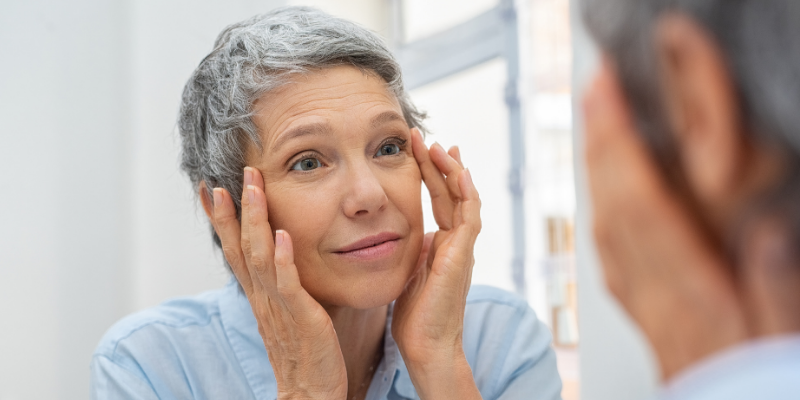What Is Glycation and How Does It Affect Your Skin?

You probably know that sugar, stress, and UV exposure can harm your skin – but did you know that all three of these factors have one thing in common? All of these external factors cause a natural process within the body known as glycation, which is linked with many specific skincare concerns. Learn more about the process of glycation, how it affects your skin, and what you can do to reverse and prevent its effects.
Glycation is just one cause of skin aging. You can learn about more here.
What Is Glycation?
Glycation is a naturally-occurring chemical reaction that causes sugar molecules such as glucose or fructose to bind to proteins and lipids throughout the body, including the skin. The result is the formation of advanced glycation end products, or AGEs. When this occurs, the proteins and lipids involved in the glycation process become damaged and are therefore unable to perform their normal functions properly.
When sugar molecules bind to collagen and elastin proteins in the skin, for example, those important proteins are unable to properly support the structure of the skin, leading to wrinkles and other signs of accelerated aging.
So what triggers this reaction to occur? A number of factors can cause glycation, including high sugar consumption, increased blood-glucose levels caused by stress, and oxidative stress caused by UV exposure, air pollution, or poor lifestyle habits.
Skin Problems Caused by Glycation
Glycation can affect the skin in many different ways. Some of the primary issues that it causes are:
- Wrinkles and creases. When collagen and elastin proteins are damaged by the glycation process, lines, wrinkles, creases, and areas of sagging or loose skin become visible on the surface of the skin. These proteins are crucial components of a healthy, youthful-looking complexion.
- Compromised barrier function. The skin’s protective barrier is made up of a bilayer of lipids. When these lipids are damaged through glycation, the barrier is unable to properly perform its two main functions: 1) to retain moisture and 2) to keep harmful allergens and irritants out. Thus ,the result of poor skin barrier function is dehydration and irritation.
- Inflammation. Glycation has also been shown to activate inflammatory pathways throughout the body, worsening inflammatory skin conditions like acne, eczema, and rosacea.
Can Glycation Be Reversed?
While glycation itself cannot be stopped altogether, it can be slowed down and its effects reversed or even prevented in the future. Our bodies can use antioxidants to combat the negative effects of glycation, but this defense is often not enough when dealing with accelerated AGE formation.
The first step toward reducing glycation and its effects on the skin is to avoid or significantly reduce exposure to those things that cause it: sugar consumption, UV radiation, chronic stress, and others.
Combine this step with the proper skincare treatment products for your skin type and unique concerns. Anti-aging ingredients such as heparan sulfate, defensins, and retinoids can help to reduce lines, wrinkles, and other signs of skin aging.
A barrier repair moisturizer such as Zerafite can restore the natural balance of lipids within the skin barrier, thus restoring its function to hydrate and protect the skin.
Anti-inflammatory skincare ingredients such as argan oil, green tea, allantoin, feverfew, aloe, and many others help to deactivate inflammatory pathways, reducing redness, itching, and irritation.
Bottom Line
Some amount of glycation will naturally occur throughout the body, but high levels of AGEs caused by excessive glycation can wreak havoc on the body and skin. Pair healthy lifestyle habits with the proper skincare regimen for your skin type and needs to combat these effects and achieve the healthy, beautiful skin you’re looking for.
Come join me as I talk about skin aging and other topics in our Skin Type Talk Series on You Tube.
©2020 Metabeauty, Inc.


